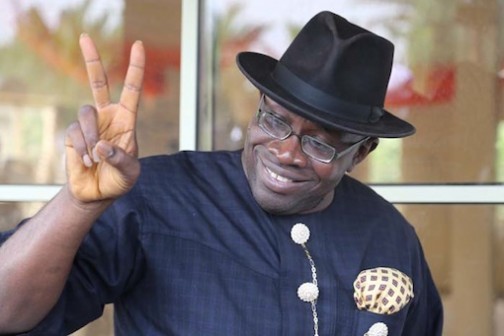The Bayelsa Governorship Electoral Tribunal sitting in Abuja on Tuesday, upheld the election of governor Seriake Dickson as the validly elected governor of the state.
The ruling came after a marathon judgment was delivered, the tribunal held that the December 6, 2015 election held in Southern Ijaw Local Government on January 9, 2016 was lawful and valid in law.
The tribunal further held that from evidence adduced before it, the election of December 6, 2015 was inconclusive and was rightfully rescheduled by INEC through the REC.
It also held that contrary to the position of the petitioner, election took place in Southern Ijaw Local Government Area of the state.
The All Progressives Congress (APC) and its candidate, Mr. Timipre Sylva has vowed to appeal the judgment.
Sylva speaking through his lawyer, Felix Okorotie described the judgment as a miscarriage of justice.
Also, the Media Adviser to Sylva, Doifie Buokoribo accused the tribunal Justices of bias as he expressed optimism that the judgment would be overturned by the higher courts.
“We tested their judgment before up to the Supreme Court and we won, this very one cannot be an exception.
Accordingly, the tribunal dismissed the petition filed by the All Progressives Congress (APC) and its candidate, Mr. Timipre Sylva for lacking in merit.
It held that the petitioners failed to prove the allegations of violence and non-compliance to the provisions of the Electoral Act.
The three man tribunal led by Justice Kazeem Alogba held that on allegations of non-voting and snatching of electoral materials by thugs of the PDP, the petitioners failed woefully to substantiate the allegations.
According to the Tribunal, “allegations of acts of criminality, violence and snatching of ballot boxes, the onus of prove lies on the shoulders of the petitioners to prove beyond all reasonable doubt.
“It is trite that he who assets must prove. The petitioners must adduced by cogent and verifiable evidence beyond reasonable doubt
“Petitioners fell short of the requirements to prove allegations of non- voting by calling only seven witnesses instead of calling witnesses from each of the polling units.
“The criminal allegations were not proved by the petitioners as required by law which is beyond reasonable doubt.
“The tribunal further cancelled a substantial number of forms EC8 which is the results sheets of the election on the ground that they did not contain the signatories or stamps of INEC officials as required by section 63 (2) of the Electoral Act.
“A substantial number of the results sheets tendered by the petitioners did not contained signatories and stamp of INEC officials.”
The DVD tendered by the petitioners rather than help their case contradicted their evidence that the Residence Electoral Commission (REC) did not adduced reason for the cancellation of the December 6, 2015 election in Southern Ijaw.
“The REC did not unilaterally cancelled the election but INEC did and gave reasons for the cancellation to include serious violence and irregularities. The REC clearly stated that election was inconclusive as a result of violence.
“To save the integrity of the process, INEC decided to cancel the election and this was clearly explained by the REC in the DVD tendered by the petitioners themselves.
“The petitioners through PW51 by their own showing contradicted their evidence that no valid reasons by adducing reasons for the cancellation. The petitioners are trying to run away from the word inconclusive”.
The tribunal said from the evidence before it, the December 6. 2015 governorship election in Southern Ijaw Local Government was inconclusive as results were not collated from the wards.
“Election is process and once any any aspect of process is not completed, you cannot say that the election was completed.
In addition, the Tribunal held that some of the petitioners witnesses testified against party interest that election took place in all the units in Southern Ijaw on January 9, 2016.
“A traditional ruler who testified for the 2nd Respondent that the petitioner, Sylva came to his ward to solicits for votes against the the January 9, 2016 election and that testimony was not contradicted.”
INEC properly ordered a rescheduling of election to January 9, 2016.
The petition is full of allegations that are not substantiated or backed up with prove as required by law.
Besides, the tribunal held that allegations were made against persons and security agencies who were not parties to the petition.
In dismissing the appeal, the tribunal held that the petitioners did not deserve the reliefs sought in their petition.
-Emmanuel Ikechukwu














